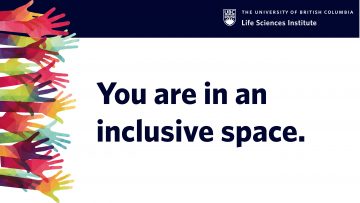Respect, Equity, Diversity and Inclusion
Official Statement
The LSI community stands against racism and discrimination in all forms.

We are committed to being a community of honour and respect, that embraces the values of equity, diversity and inclusion. Practicing these values, the LSI will be a place where our students, faculty and staff thrive; working, learning and growing as scientists, and as people.
To support these efforts, please consider the following resources:
UBC’s respectful environment and discrimination policies are a good place to start, by understanding your rights and options, and the rights and options of other people.
We encourage anyone who feels uncomfortable walking on campus at night to make use of Safewalk, a service that provides walking and driving teams to accompany you at after dark.
You can find more information on UBC’s Student Services bullying and harassment page. It lists on-campus services for advice, assistance and advocacy. The AMS website has a list of anti-racism support resources, and the Department of Asian studies has its own anti-racism resource page as well.
The LSI leadership and administration will continue to partner with Respect, Equity, Diversity and Inclusion (REDI) committees of our three resident departments to fight racism and discrimination.

Nursing Room
Room 1.351 in the LSI Administration area behind the reception desk is a personal care room, suitable for nursing and pumping. The LSI Faculty lounge is just around the corner, and has a sink and fridge available if required. Access to this area may need to be added to your card, and the room can be unlocked by either security (604-822-3734) or one of the nearby office occupants.
The code to access the room is 5113.

Gender Neutral Washrooms
This gender neutral single stall accessible washroom is open to public from 7 a.m. to 6 p.m., Mon to Fri. Outside of these hours, it’s only accessible to those with access cards.
The washroom is located down the hallway on the southeast corner of the LSI East Atrium, near the entrance. Across from LSI 1.535.

Prayer Room
The LSI has a prayer room available for the use of all members located in #1.537b.
The access code is 1357.
Additional Resources
Features

What are your mentorship practices? An interview with Killam Awardees for Excellence in Mentoring by Sasha McDowell, EDI Columnist for The/Lifeline, LSI’s newsletter
They walked center-stage towards the podium, towards recognition for their respective achievements. Their names reverberated in the grand auditorium of the Chan Centre. What an auspicious moment to be honored here, at the recommencement of UBC’s graduation ceremony. Read more.

Difficulty finding mentors within the LGBTQ2S+ STEM community spurs creation of an online platform by Sasha McDowell, EDI Columnist for The/Lifeline, LSI’s newsletter
About a year ago, Scott Cocker and Kyle Shanebeck, two graduate students from the University of Alberta, raised a concern about the lack of visibility of LGBTQ2S+ researchers during a casual conversation. “We spoke about how difficult it would be to find a supervisor who is a part of the community,” Kyle explains. Read more.

Considering Your Privilege Makes You a Better Colleague
We all benefit from some degree of privilege — whether it’s related to your race, gender, abilities, class, or other factors. These facets of our identity are part of our professional lives, whether we like it or not. Acknowledging your privilege can lower your defenses, demonstrate vulnerability, and set the tone for inclusive behaviors. Start by doing some reflecting. Which parts of your identity act as tailwinds in your day-to-day work life? These may be things you hardly ever think about because they rarely face resistance or scrutiny: for example, your education status if you went to college and work in an industry where the majority of your colleagues also went to college. Next, remind yourself that your privileges are not character flaws or reasons to feel ashamed; they’re just a part of who you are. Finally, pay attention to what’s happening around you. Who is speaking up? Who is not? Who is given the automatic benefit of the doubt? Who must work harder to prove themselves? Becoming more aware of these factors will help you become more empathetic and sets the tone for a more inclusive team culture. This tip is adapted from the article “Talk About Privilege at Work“, by Lee Jourdan, for the Harvard Business Review.

The National Forum on Anti-Asian Racism
On June 10–11, 2021, LSI members were encouraged to join the National Forum on Anti-Asian Racism and contribute to these crucial discussions. ‘You have a role to play in the fight against pervasive and enduring anti-Asian racism.’ Re-watch the event here.

The accessibility of English as the universal language of science by Sasha McDowell, EDI Columnist for The/Lifeline, LSI’s newsletter
To gain a better understanding of the difficulties non-native English speakers face in their scientific studies, I encouraged two trainees to share their experiences. The first interviewee, a native Spanish speaker, recalled her first days in college in her home country: her professor gave the class an English paper and said, “This is going to be your whole life. Better start soon.” Read more.